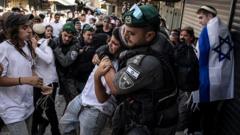On Jerusalem Day, far-right marchers targeted Palestinians in the Old City, leading to violent clashes. Opposition leaders condemned the events, citing a rise in hatred and racism, while the Israeli government affirmed its sovereignty over Jerusalem. With escalating tensions due to ongoing conflict in Gaza, calls for peaceful co-existence resound among opposition figures.
Tensions Rise as Far-Right Marchers Clash with Palestinians During Jerusalem Day Celebrations

Tensions Rise as Far-Right Marchers Clash with Palestinians During Jerusalem Day Celebrations
A Jerusalem Day parade marked by violence raises concerns over increasing nationalist sentiments and tensions between Israelis and Palestinians.
In a stark display of rising tensions, far-right Israelis marked Jerusalem Day on Monday by chanting anti-Arab slogans and physically assaulting Palestinians within the walled Old City. The annual event commemorates the Israeli capture of predominantly Palestinian East Jerusalem during the 1967 Arab-Israeli war. Reports indicate that aggressive nationalism overshadowed celebrations as extremist sentiments surged, prompting condemnation from various political leaders.
During the parade, which drew thousands of participants to the Damascus Gate, chants such as "death to Arabs" and "May your village burn" echoed through the streets as right-wing activists displayed banners proclaiming "67 - Jerusalem in our hands; 2025 - Gaza in our hands." The atmosphere escalated when Palestinian merchants, some still tending to their shops, were confronted aggressively by demonstrators, leading to violent altercations that saw several marchers detained by Israeli police.
Israeli opposition leader Yair Lapid criticized the event, describing it as a "festival of hatred and racism," an affront to Jewish values, while his colleague Yair Golan described the scenes as emblematic of a troubling trend of intolerance and bullying. Both leaders expressed a commitment to reclaiming a more inclusive vision of Jerusalem, calling for unity among its diverse population, including Jews, Christians, and Muslims.
Israeli Prime Minister Benjamin Netanyahu, during a morning cabinet meeting, reaffirmed plans to maintain control over Jerusalem, insisting that the city remains "united" under Israeli governance. Meanwhile, National Security Minister Itamar Ben Gvir’s rhetoric escalated tensions as he called for the death penalty for "terrorists" while participating in the march, further complicating an already fraught atmosphere in the region.
The march's timing coincides with the escalation of violence in Gaza, where ongoing Israeli military operations have led to significant civilian casualties. Since the outbreak of conflict triggered by Hamas's attacks earlier this month, reports indicate that over 53,000 individuals have lost their lives in Gaza, with significant numbers being children.
The Palestinian presidency sharply criticized the actions of the marchers and government officials, claiming such provocations threaten regional stability, underscoring the complex and often violent interplay of nationalism and identity in the ongoing conflict. As tensions bubble over, calls for a peaceful and unified Jerusalem grow increasingly urgent amid the ongoing cycles of violence and xenophobia in the region.






















